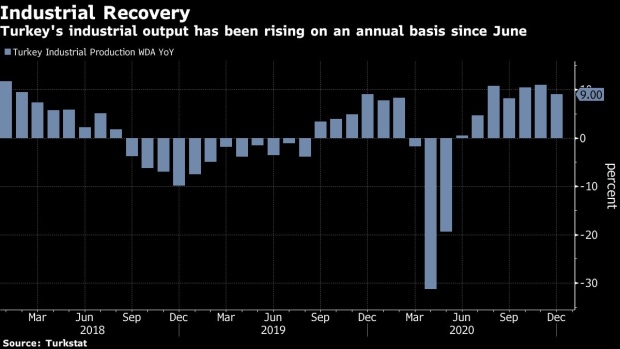Feb 12, 2021
Turkey’s Factory Output Signals Strong Activity in Final Quarter
, Bloomberg News

(Bloomberg) -- Turkish industrial output expanded on an annual basis for a seventh month in December in a sign that economic activity capped the year on a strong footing.
Industrial production adjusted for working days rose an annual 9% in the last month of 2020, marking the longest streak of growth since 2018. On a monthly basis, the gauge jumped 1.3%.
The rebound came after the Turkish government pushed banks to ramp up lending to help businesses and consumers ride out the pandemic. The credit boom was coupled with a front-loaded easing cycle that helped prime the economy at the expense of currency stability. A weak lira and rapid credit growth underpinned by negative real interest rates kept inflation in double digits the entire year, forcing central bank Governor Naci Agbal to raise the benchmark interest rate by 675 basis points to 17% since his appointment in November.
“The durability of growth in Turkey is simply remarkable,” said Timothy Ash, a London-based strategist at BlueBay Asset Management. “This comes amid policy tightening and suggests that with a positive output gap, monetary policy settings are still not tight enough for the central bank to meet its target of single digit inflation by year-end.”
Turkey’s gross domestic product might have expanded as much as 2.5% last year, a performance better than all other major economies hit by the Covid-19 pandemic, BloombergHT reported, citing the central bank.
Turkish Central Bank Says Economy Thrived in Pandemic Year: BHT
Turkish economy expanded 0.9% last year, according to a Bloomberg survey of 26 analysts conducted from Jan. 22 to Jan. 27. The economy probably grew as fast as 2.7% in the final quarter of 2020 before its annual pace slowed to 1.6% during the first three months of this year, the survey showed. The statistics office is scheduled to publish fourth quarter GDP data on March 1.
©2021 Bloomberg L.P.